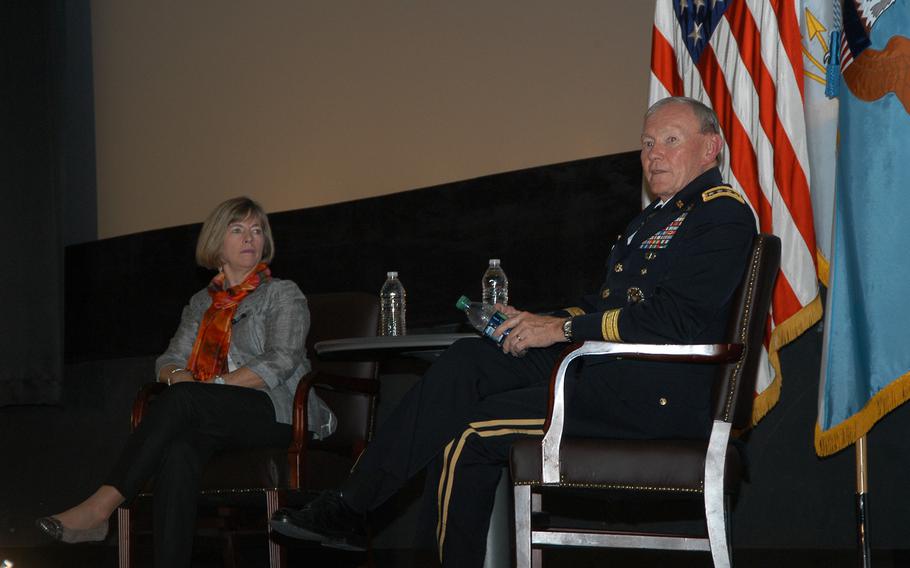Asia-Pacific
US troops can expect change in Korea, top general says
Stars and Stripes October 1, 2013

Gen. Martin Dempsey, chairman of the Joint Chiefs of Staff, and his wife, Deanie, spoke at a town hall-style meeting with about 300 servicemembers and their spouses at Yongsan Garrison in South Korea on Tuesday, Oct. 1, 2013. Dempsey answered a wide array of questions during the hour-long meeting. (Jon Rabiroff/Stars and Stripes)
YONGSAN GARRISON, South Korea – Chairman of the Joint Chiefs of Staff Gen. Martin Dempsey said Tuesday that significant changes in the U.S. military’s plans here could be in the offing.
Speaking to about 300 servicemembers and their spouses at a town hall-like meeting, Dempsey said officials are talking about the timing of transferring wartime operational control from the U.S. to South Korea, how American assets and manpower should be deployed here and when virtually all U.S. troops will be consolidated south of Seoul.
“Give us a few months,” Dempsey said. “I think the landscape will begin to clear a bit between now and the end of this calendar year on OPCON transition, tour normalization [and] the implications of any changes to those on ([the planned consolidation of troops].”
The transfer of operational control has been the subject of continuing debate in Washington and Seoul for years given the ongoing threat posed by North Korea and differing opinions about whether the South’s military is up to the task of leading the fight if hostilities resume on the peninsula. The transfer of responsibility was supposed to happen in 2007, but was postponed until 2012. In 2010, that target date was pushed back again, to 2015. And in recent weeks, Korean media outlets reported that Seoul had asked Washington to once again postpone the move due to ongoing concerns about North Korea’s nuclear weapons program.
When asked about OPCON transfer, outgoing U.S. Forces Korea commander, Gen. James Thurman, said “the (South Koreans) know that they need to develop some more advanced capabilities, but it takes a while to do that.”
“We have…obviously a condition-based plan to examine these current capabilities” before the transfer takes place, Thurman said. “We want to make sure that they do have all of the necessary capabilities, and number one, they have to be interoperable with the U.S.”
The transfer of command and the related 2016 plan to move most U.S. troops now stationed in and north of Seoul to bases south of the South Korean capital are both designed — symbolically and practically — to give the South’s military a more high-profile role in the defense of its country after 60 years of American control.
Dempsey said delaying the command transfer is under discussion because, “the threat is a little different than when we made the plan a few years ago,” without specifically mentioning the North’s nuclear program.
In addition, the chairman said, the U.S. military continues to track the capabilities of the South Korean military, “some of which are on track and some of which are not on track.”
“So, we’re trying to determine what the right timing is, and it may not turn out to be 2015,” he said. “That’s a decision that will be made by political leaders supported by military advice.”
Dempsey said U.S. and South Korea are also talking about potential changes in the American troops and equipment sent to the peninsula.
“I think what you’ll see over here is about the same level of commitment,” he said. “[But], there are a couple of other capabilities we’d like to get over here … [to] thicken our deterrence and our defense.”
Any new units and capabilities “will probably be rotational,” Dempsey said, adding that U.S. and South Korean officials are also talking about how many of the 28,500 troops here will be permanent as opposed to rotational.
During the hourlong meeting, the chairman answered an array of questions from the audience to include the impact of the shutdown of the federal government to the military’s efforts to fight the problem of sexual assault within the ranks.
Referring to the shutdown, Dempsey said, “We’ll get through this … and I’ll help you do that.”
On the subject of sexual assault in the military, Dempsey said he was encouraged by increases in the reporting of incidents.
“I think we’re doing well, but I’m not at all complacent with what ‘well’ means,” he said, adding that the burden of fixing the problem is not just the responsibility of military leaders.
It comes down, he told the audience, “to how you all interact with one another.”